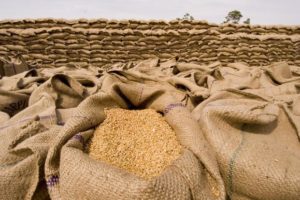
The Nigeria Cassava Growers Association (NCGA), says Nigeria can save N2 trillion from the importation of wheat, if appropriate measures are put in place to boost cassava cultivation.
The National President of NCGA, Segun Adewunmi, disclosed this at the 1st Cassava Stakeholders’ Workshop organised on Wednesday by Covenant University, Ota, Ogun.
“Cassava can actually trigger massive industrial revolution if the Federal Government can address challenges confronting the planting of cassava in the country.
“There are over 20 products that could be exacted from cassava; Products like ethanol, industrial starch, glucose syrup and sweetener were incidental raw materials for numerous utility items with limitless market potentials,’’ he said.
The NCGA president said that the nation spent over N2 trillion annually to import ethanol, industrial starch and wheat into country and this is not healthy for the economy.
He advised the Federal Government to support farmers by providing sufficient funds that could be used in carrying out research in tackling virus diseases ravaging cassava.
Adewunmi said that the ability of the Federal Government to do this would boost foreign earnings and create jobs opportunities for the teeming unemployed youth.
Dr Angela Eni, an Associate Professor of Virolgy, Department of Biological Sciences, Covenant University, Ota, said that the project that convened the workshop was called `West African Virus Epidemiology’ (WAVE) for Root and Tuber Corps.
Eni, also the convener of the workshop, said that currently the first phase of the project was to address virus diseases affecting cassava productivity.
She stressed the need to address virus diseases affecting cassava productivity because it is a tolerance crop that could grow on any soil and also serve as food security for Africans.
”The kind of yield farmers get from cassava could provide food for over 800 million Africans.
”But there is a problem of virus diseases affecting the tuber, which made tuber yield to be low,’ she said. S
he said that there was a new virus disease called `Cassava Brown Stream Virus’, which was not present in West African but ravaging cassava in East and Central African.
Eni said that this virus had virtually affected the tubers and had reduced productivity from cassava.
”The biggest objective of WAVE that is happening in West African is to ensure continuous exclusion of cassava brown stream virus from West African countries.
“WAVE is preparing to respond rapidly in case the cassava brown stream virus spread to West African countries so that we do not have the repeat of Ebola crises,’’ she explained.
The four days workshop with the theme: ”Cassava Virus and Clean Seed Awareness,” opened on July 3 and will end on July 6.
